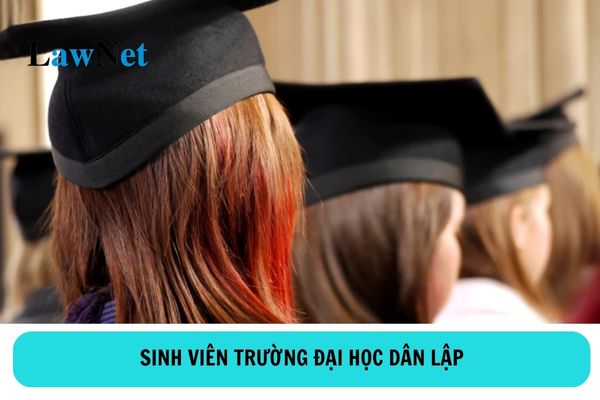Vietnam: What are the rights of students of people-found universities?
What are the duties and rights of students of people-found universities in Vietnam?
* Regarding duties:
According to Article 49 of the Regulations on People-Found Universities issued with Decision 86/2000/QD-TTg, students at people-found universities have the following duties:
- Study and train according to the school's educational plan and curricula.
- Comply with the state laws and adhere to the school's rules and regulations.
- Participate in labor and social activities appropriate to their age, health, and capabilities.
- Pay tuition fees.
- Maintain and protect the school's property.
- Contribute to building, protecting, and promoting the school's traditions.
* Regarding rights:
According to Article 50 of the Regulations on People-Found Universities issued with Decision 86/2000/QD-TTg, students at people-found universities have the following rights:
- Be provided with full and prompt information about their studies similar to students at public universities.
- Pursue postgraduate studies, study ahead of schedule, skip classes, shorten the curriculum duration, or take a leave of absence in accordance with the regulations of the Ministry of Education and Training.
- Participate in the activities of social organizations within the university as per the law.
- Use facilities and equipment serving academic, cultural, physical education, and sports activities of the university.
- Directly or through their organizations, propose solutions to the university to help build, protect, and ensure the legitimate rights and interests of students.
- Enjoy social policies as prescribed by the State.
- Have equal opportunities in job-seeking as students of public universities.

What are the rights of students at people-found universities in Vietnam? (Image from the Internet)
What are the disciplinary measures against full-time students at people-found universities in Vietnam?
Pursuant to Article 9 of the Regulations on Student Affairs for full-time Undergraduate Program issued with Circular 10/2016/TT-BGDDT, the disciplinary measures are specified as follows:
Disciplinary measures and Violations
1. Violating students may, depending on the nature, extent and consequence of their violation, receive warnings, reprimands or may be subject to one of the following disciplinary actions:
a) A disciplinary action represented in the form of reprimand shall be imposed on students who commit less serious violations for the first time;
b) A disciplinary action represented in the form of warning shall be imposed on reprimanded students who continue to commit violations, or those who commit less serious violations in a continual manner, or those who commit violations for the first time which are relatively serious;
c) A disciplinary action represented in the form of fixed-term academic suspension shall be imposed on students who breach rules and regulations or commit serious violations against regulations on student's prohibited acts during the warning period; those who contravene laws and are subject to a suspended sentence. As the case may be, Heads of higher education establishments may consult training rules to make decisions on the suspension term, i.e. the term of one semester, one academic year or the term the same as the suspended sentence period.
d) A disciplinary action represented in the form of forced expulsion shall be imposed on students who continue to breach rules during the fixed-term suspension period, or commit violations for the first time which have extremely serious nature or level and cause adverse effects on their higher education establishments and society; those who contravene laws and serve jail sentences.
2. A disciplinary action which is at least a warning must be recorded into student administration documentation and informed to student's families. Where students are subject to fixed-term suspension or expulsion, higher education establishments must inform local authorities and student's families for their coordination in supervision and education of these students.
3. Details of violation and disciplinary framework shall be prescribed in the Appendix hereto attached.
Thus, there are four disciplinary measures against full-time students at people-found universities, including:
- Reprimand;
- Warning;
- Fixed-term academic suspension;
- Forced expulsion.
What are the prohibited acts for students at people-found universities in Vietnam?
According to Article 61 of the Law on Higher Education 2012, the prohibited acts for students at higher education institutions in general and students at people-found universities specifically include:
- Offending the honor, dignity, abusing the body of lecturers, management staff, employees, other students at higher education institutions and other people.
- Cheating at study, examination and enrolment.
- Engaging in activities of social evils or disturbances in higher education institutions or at public places and other acts of violations of law.
- Organizing or participating in illegal activities.

